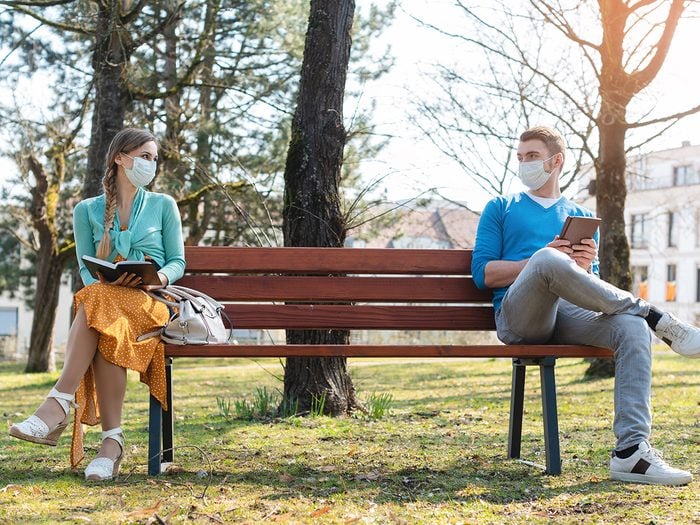
How to navigate friends, family and social outings in a vaccinated world
At a recent socially distanced gathering, I found myself in an unwanted conversation with a person I barely knew. With my actual friends standing on the same lawn, the idle chit-chat felt like a waste of my visiting time and energy. I grew increasingly hot and twitchy. Soon, to my deep surprise, I had to bite my tongue to avoid blurting “I don’t want to speak with you.”
Luckily, I didn’t say it out loud, and the rude thought stayed in my head where it belonged. The encounter made me realize that spending so much time wandering listlessly around my own tiny household bubble had eroded my social skills. I wondered if my manners were also becoming a relic of the past, just like eating indoors at restaurants and nights out at the movies.
Many of us may be feeling similarly rusty as we prepare to open our homes and our hearts again to family, friends and neighbours. It’s an exciting time, but also a good moment to reflect on what we’ve longed for most and what we haven’t missed that much at all during the pandemic. Those insights can help shape our social re-entry plan. Here are some tips for getting back into social shape.

Be patient with yourself
Just as our jurisdictions have distinct phases of gradual reopening, we can take things one step at a time as we re-enter a busier, more normal life. We don’t have to leap from sitting at the window watching the cat across the street, straight into packed parties and noisy barbecues. We might be surprised to discover we have some new mental and emotional limitations after having lived at a slower, quieter pace.
Nafissa Ismail is an associate professor of psychology at the University of Ottawa. She confirms that we, and our brains, need to get back into shape, socially speaking. “Socializing is a skill and we get better at it as we practise it,” says Ismail. “With the isolation and the restrictive measures we didn’t get much time to practise.”
Those of us who spent the pandemic in smaller households, working from home, may require more practice than others before we can easily maintain a long conversation in a room full of people. “We need to relearn those in-person social skills,” says Ismail. “It’s a lot for the brain to coordinate, knowing who to listen to, monitoring our movements, our own speech production. It will take some time.”
Here’s how to make new friends—even if you’re all grown up.
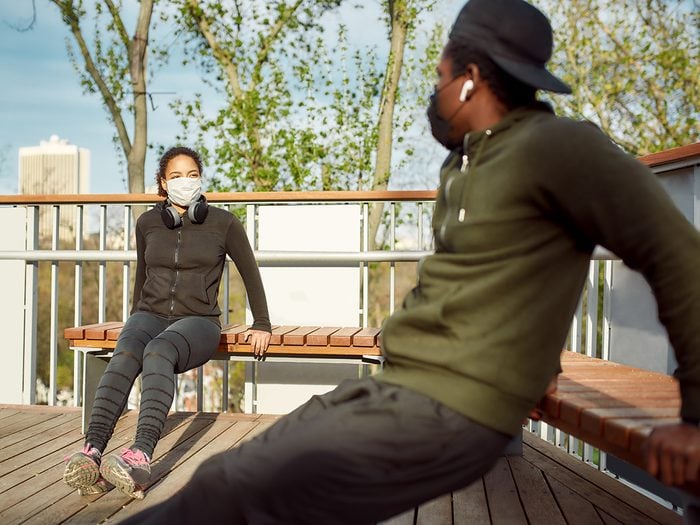
Be patient with others
Going to public events, however much we might want to, may also be more tiring than we expect. Ismail says that new fatigue is normal. “Our brain is working overtime,” she explains. “With time, we will relearn how to coordinate everything and get over the exhaustion. We will have to take it slowly.”
Some friends will take longer than others to experience the relief and joy of society opening up again. And, as we do gather together again, we will need to be sensitive to the ways in which the pandemic has affected us all differently, whether it’s a job loss, relocation, long separations, anxiety, depression or the deaths of loved ones. “We hear people say we’re returning to normal, but those who lost loved ones will never return to normal,” reminds Ismail. “We need to be aware of that, too, as we are socializing.”
These random acts of kindness will inspire you to pass it on.
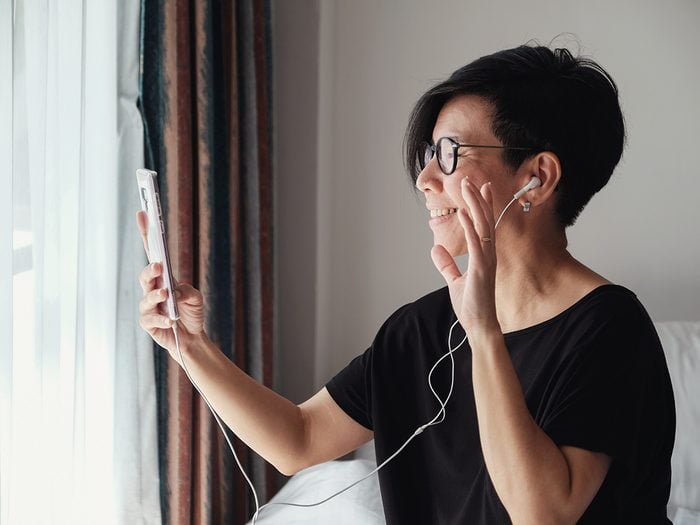
Start small and be selective
It’s possible that the pandemic has been a powerfully clarifying event in our lives. We know who we missed seeing, and we might also have a short list of people we didn’t pine for quite so much. This is important information to have and it can help us create some new priorities. “When everything was mediated by phone or video chats, who did I hear from? Who did I want to hear from?” asks Sharon Ramsay, a registered marriage and family therapist in Toronto. “Who regularly nourishes us, and could we maybe pour into those relationships a little bit more?” Relaunch your social life with those friends first, says Ramsay.
Here’s what you need to know about the COVID-19 booster shot in Canada.
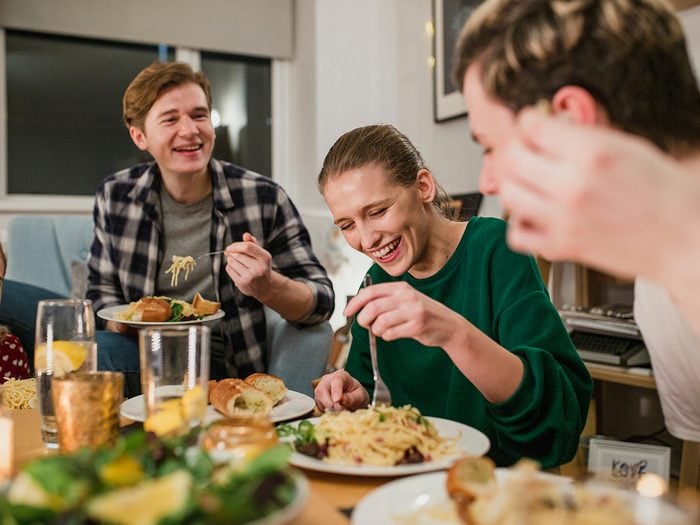
Embrace new forms of visiting and entertaining
When we do meet again with our social circles, whatever their new shape, we may also discover we’re no longer as interested in our old go-to activities. The pandemic has taught us that we can enjoy a visit with a friend by taking a walk together or by sitting on opposite ends of a park bench, eating sandwiches we brought from home. Simple can be good, and that can remain true as we move forward.
Lucy Waverman, cookbook author and a food columnist for The Globe and Mail, believes that smaller scale hospitality will continue for some time, and she says that’s just fine. “It has to do with exhaustion in general and specifically exhaustion with cooking,” says Waverman, nodding to one of people’s favourite lockdown activities. “I like cooking but I’m fed up with it myself.”
Keep it simple, at least as you start to have people over again, she advises. “Put a nice piece of salmon on the grill,” she says, by way of an example. “There’s no need to make salmon Wellington.” Ordering takeout for you and your company from your favourite restaurant is also officially okay.
Discover how doing these simple tasks might help you pass the time during the pandemic.
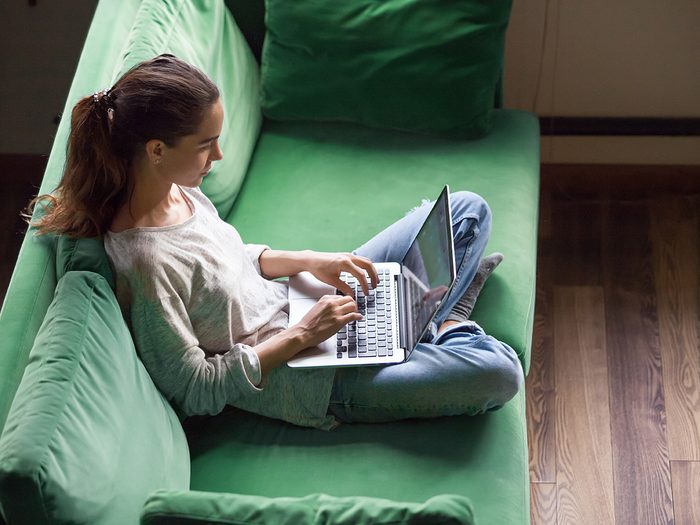
Take time now to reflect and record
During the pandemic, Nafissa Ismail finally took the piano lessons she never had time for. Sharon Ramsay purchased beautiful stationery and regularly mailed letters to friends and relatives. I tried yoga, and found I loved it.
Eventually, life will start to pick up its pace, and if we’re not careful, we might find ourselves running around in circles once again. “One of the gifts of the pandemic has been to recon- sider how we live,” says Ramsay. “Some folks might have taken to walking and cycling. Is that a habit you want to continue? What have been the splashes of joy in the cesspool of the pandemic?”
Ismail suggests sitting down with a piece of paper and making an actual list of the practices that brought some happiness during what might have been one of the most difficult experiences of our lives. Don’t forget the good things we’ve learned, she advises. It’s okay to rest and to keep doing the hobbies we discovered during lockdown. “We don’t need to constantly please others,” she says. “It was a good life lesson to realize it’s okay to slow down.”
Next, learn how to calm anxiety during the pandemic.